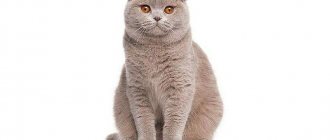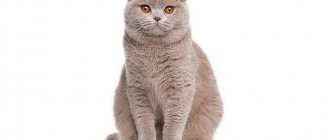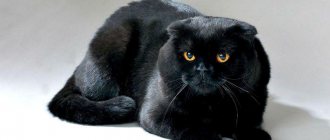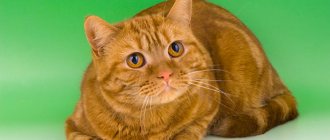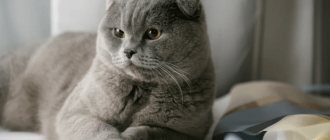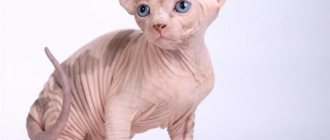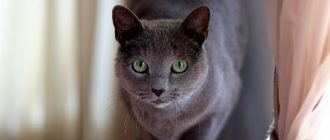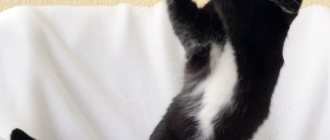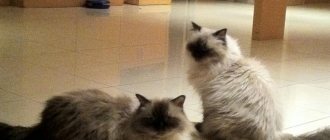At the beginning of the last century, England was the felinological center of Europe. Breed standards were drawn up here for the first time, the first cat show in world history was held, and 3/4 of the 170 animals announced for participation in it consisted of British shorthair cats. Among them they found a kitten with curled ears, which became the first representative of the new breed.
British Fold cats quickly gained popularity and took pride of place in the breed hierarchy. Subsequently, a standard was drawn up for them and their character, habits and health characteristics were studied in detail.
Brief history of the breed
Experts disagree on exactly when the British Fold appeared.
- The first version dates back to the time when the ancient Romans conquered Britain (around 43). Egyptian cats also came along with the invaders, who later adapted to the new climatic conditions.
- Another hypothesis mentions the Crusades - the warriors appreciated the useful abilities of the eastern rat catchers and brought them home.
- Cats infiltrated merchant ships that sailed between the Old Continent and Africa. There were always a lot of mice on ships, and the crew favored small animals that helped get rid of rodents.
What is known for certain is that the first British cats came to the European mainland from North Africa and the Middle East. Further formation of the breed took place under the influence of local conditions: the animals developed thicker hair and developed immunity against diseases common in the area.
Prohibitions
As already noted, it is forbidden to mix 2 different breeds. Otherwise, problems with the musculoskeletal system will arise. If you have a cat that was obtained by crossing two breeds, contact a veterinarian when it grows up. These species have problems with their legs; it is difficult for them to move their body, since the legs are thin and longer than usual. In general, this breed tends to get hereditary diseases and skeletal problems. If your pet has undergone surgery, increased bleeding may occur.
© shutterstock
Interesting facts about the British cat breed
Descriptions in ancient books and images in paintings indicate that the first British cats were not fold-eared:
- The Gospel from Lindisfarne (7th century) contains an image of a cat that is very similar to the modern Briton.
- The Book of Columba, a recognized handwritten masterpiece of the Irish monks, also contains illustrations of straight-eared cats.
You can read more about straight-eared Britons in this article.
Artists and sculptors depicted them to pay tribute to the beauty and grace of these animals. The monks wrote in poems that the life of hermits becomes more interesting and fun if a cat lives nearby. She was the only pet allowed to live on the grounds of nunneries.
This is interesting! England became the first country to pass a cat protection law. In 936, the English prince Howell Dda issued a decree prohibiting any violence against these animals.
Differences
Since the English Fold cat is very similar to the Scottish Fold, animal lovers often confuse them. To avoid confusion, it is worth finding out what their difference is. And the difference is in everything, after reading this you will understand how different these animals are. The differences between them are all over:
- Appearance.
- Character.
- Communication with others.
- Fears.
At first glance, you can see the difference in the photo of the Briton, because... British pets are earthy and stocky. The neck has more defined features, and the tail is much longer. Oddly enough, the ears of these animals are also different.
Description of the British Fold breed: standards, appearance and character of the cat
The breed standard details the characteristics required for the breeding of the British Fold cat.
Dimensions and weight
A strong, medium-sized cat with a dense build. Newborn British Fold kittens weigh from 70 to 130 g. In the first week, body weight increases 1.5 times. Further indicators will depend on the gender of the pet - boys gain weight faster, and girls are traditionally more petite and graceful.
The average weight of an adult British cat is 8 kg, and female cats are usually 2-2.5 kg less. The average height of an animal is 28-35 cm, with cats being approximately 5 cm taller than female cats.
Important! One of the peculiarities of the breed is that the British reach puberty at 2 years of age, but they gain weight before the age of 5.
Anatomical characteristics of the British Fold - what a cat of this breed looks like
British fold cats can be divided into three groups:
- Traditional British Shorthair. The auricles are small, with a slight rounding at the apex. The coat is thick and shiny. Powerful and flexible tail of medium length.
- Long-haired cat. Breeders crossed the British with other breeds (Persians or representatives of the Somali branch) in order to obtain new colors. But in addition to color, the animals inherited long hair from their parents. Such kittens were first culled, and later interbreeding was prohibited. But the population of mestizos increased and was subsequently officially recognized by felinologists as the British longhair cat.
- Fold-eared Briton. A cat with short, thick hair and ears that curve forward. The body is wide, the paws are low. Some international felinological organizations do not officially recognize the breed because they consider lop ears to be a defect that was caused by a gene mutation.
This is interesting! All newborn kittens of this breed have straight ears, so it is impossible to immediately determine whether the pet will have fold ears.
British coat color and type
The Scottish (or British Fold) breed took from its parent branch a short, thick coat with a dense, elastic texture and a warm undercoat.
Traditional colors include:
- blue lop-eared British;
- gray fold cats;
- tabby tabby cats.
There are about 200 combinations of different colors in the colors of the British Fold cat breed, including the exotic acromelanic color point.
Possible breed defects
An uncontrolled mutation negatively affects the condition of skeletal bones, joints and spine in (Scottish) British fold cats. To counter the deterioration of the genotype, felinologists and breeders had to develop some rules that prevent the development of irreversible defects.
- When crossing, the union of two fold-eared parents is avoided. In a cat “marriage,” a British Fold is matched with a cat from a different breed—an American Shorthair or an exotic.
- Even as a result of mating with representatives of other breeds, offspring may be born that are predisposed to loss of tail flexibility due to fused vertebrae. For this reason, felinologists cull short-tailed British cats, which are more prone to developing this disease than others.
Geneticists were able to find out how this mutation affects the health of the British Fold cat. It turns out that negative consequences occur only in the presence of a homozygous form, when both acquired genes are present in the same paired state.
Alleles that scientists have already studied are responsible for lop ears. In the FdFd variant, they lead to irreversible consequences, and the Fdfd combination is completely safe for the health of the British Fold cat.
Important! If the cat has signs of lameness, and small kittens avoid active movements such as running and jumping, this is a signal of the presence of a congenital disease.
Colors
The luxurious plush coat of the British Fold is always stuffed and soft to the touch, and thanks to the cleanliness of this breed, it is always shiny and looks well-groomed. At the same time, kitties have a neat and gentle appearance, while cats can be slightly disheveled.
Colors can take on a wide variety of shades and patterns, including:
- Single color solid. Gray-blue representatives are more common, although some have fur that can be red, black, grey, brown, lilac, and less commonly white or peach.
Solid white
- Striped, marbled or spotted colors are indicated by adding the word "tabby" to the base color. At the same time, on a lighter base there are dark stripes, stains or spots that form the letter “M” on the forehead.
Tabby
- A smoky shade appears when each hair is colored only a third of the main color, and a chinchilla shade - if it is an eighth. The rest of the fibers may be silver or white. Also read the article about the British chinchilla.
Chinchilla shade
- The Siamese Colored has a light body with darker limbs. Thus, chocolate or almost black paws, tail, ears and muzzle stand out against a cream background.
Siamese Colored
- Tortoiseshell coloration is often black with splashes of different shades of red. Sometimes cream can be combined with gray or brown.
Tortoiseshell coloring
- Bicolor has two colors - white with blue, chocolate, black. Light in the lower part of the body, combined with tortoiseshell at the top, forms the “calico” color, characteristic of Scottish cats.
Color Bicolor
The character and temperament of the British (how they treat children, do they get along with other animals)
The habits of the British Fold cat and its character do not at all correspond to the parent breed:
- The behavior of the British cat is balanced; it does not show aggression towards others.
- A distinctive character trait of the British Fold is devotion to the owner and other family members.
- Despite their sociability, representatives of this breed can easily tolerate loneliness.
- British cats get along well with children and enjoy taking part in general games, but do not like to be treated roughly.
Price
There are many nurseries selling British fold kittens in Russia; finding a pet is not a problem. The breeder must provide the buyer with a veterinary passport and information about the kitten’s parents.
If prices for a purebred “Scottish” cat reach 50 thousand rubles, then a British kitten is much cheaper, because this fold-eared cat is an unrecognized breed. For a British fold kitten they ask from 1000 to 5000 rubles.
The lop-eared “British” is loyal, affectionate, playful, and behaves with dignity. Although he cannot participate in exhibitions and competitions, since his breed does not officially exist, he will become a wonderful companion for a lonely elderly person and a friend for a large family.
Did you like the article?
Leave the content of the British
British cats are short-haired, so they are brushed at least once a week, and every other day during heavy shedding. To care for the fur, use standard “cat” combs or special gloves, which can be purchased at a pet store.
The presence of slight discharge from the eyes and nose is normal for the British Fold cat. The owner needs to regularly carry out hygiene procedures - clean the nose and eye area from dirt.
Particular attention should be paid to cleaning the ears of a British Fold cat. The unusual structure of the shell complicates the procedure, so you need to act very carefully so as not to harm your pet.
- First, the bent tip of the ear is bent and access to the inside is freed.
- Using a cotton swab, carefully clean the areas that are in your field of vision.
- For deeper cleaning, use special ear drops or other preventive liquid preparations that can be injected into the ear canal.
Unusual cat behavior is a cause for concern. If your pet shakes its head or there is an unpleasant odor coming from the ear, you should immediately seek help from a veterinarian.
Feeding a British Fold cat
The diet depends on the individual characteristics of the cat. The pet owner must choose one of three options:
- natural food;
- industrial feed;
- mixed feeding.
Practice shows that in real life all three points are used. During childhood, owners and breeders most often feed British Folds with homemade food and independently calculate the portion and calorie content.
Adult cats switch to dry kibble without any problems. And in old age, the animal happily eats both the first and the second.
Important! Representatives of this breed are prone to overeating and gaining excess weight. This is dangerous for the cat's health, since it has a genetic predisposition to diseases of the bones and joints.
Care
To preserve the beauty of the breed, proper care is needed. These pets are just like picky gourmets. You will have to work a little on the serving and diet. You always have a choice: dry food or preparing your own food. The advantage of dry food is that manufacturers take into account all daily requirements and create a balanced diet. The second case - feeding with natural products, involves premature preparation of the diet. Pets love:
- Meat with a low fat content.
- Dairy products.
- Poultry meat.
- Vegetables.
- Cereals.
Education and physical activity
Despite their sociability, the British are independent and willful. Therefore, when training and raising a pet, certain rules should be followed:
- You need to show your cat your dissatisfaction immediately after committing an offense.
- It is important to maintain consistency in the training process - for example, you should not allow your pet to sharpen its claws on the back of a chair today, and scold your pet for it tomorrow.
- Praise is very important for the British Fold - do not forget to reward the cat for positive actions.
Physical activity is one of the main indicators of an animal’s quality of life. It is necessary to provide the animal with sufficient space for play, prepare toys and be sure to engage with it.
Vaccinations and antiparasitic treatments
A standard scheme for the prevention of internal and external parasites (endo- and ectoparasites) is applied to British cats.
Before a kitten goes to a new owner, the nursery must carry out deworming and flea treatment. In the future, preventive measures are carried out according to the following scheme:
For lop-eared Brits who don't go outside:
- Treatment against external parasites using drops or in combination with a special collar – once a month.
- Antihelminthic procedures are carried out once every 6 months, in the first week after treatment against ectoparasites.
Cats that go outside are dewormed and treated for external parasites 2 times more often.
Important! You can become infected with worms and fleas even in an apartment - the larvae are brought into the room with shoes or clothes.
Sterilization and castration
In order not to deteriorate the breed, experts recommend spaying/castrating cats with minor or critical defects. Not everyone knows that sterilization and castration of animals are two different procedures, and cats are also castrated.
- Sterilization does not involve the removal of organs, but only limits their reproductive functions. It is considered more gentle and humane towards animals. However, after sterilization, the behavior of cats does not change. They still have a natural desire to mate, but are physically unable to produce offspring.
- Castration is carried out on both male and female cats. As a result of surgery, the testes (for males) and ovaries (for females) are removed. The production of sex hormones stops, reproductive function is absent.
Hidden dangers of surgical procedures exist, but such operations are always planned and have already become familiar to veterinarians.
Dangers
How your pet will feel depends only on you. If it worsens, you should pay attention to your diet. Their food consumption is 30% more than that of a regular cat. If you see health problems, adjust your diet. In addition, lack of attention will also make you anxious. After all, they love attention very much and if it is not enough, then dirty tricks will begin due to insults.
The life of a cat is 12 years, but this is provided that you keep an eye on it and its nutrition. Especially, you need to pay attention to him in the 10th year of life. It would be a good idea to consult a veterinarian and adjust your diet.
Pros and cons of the British cat breed
| Positive traits | Negative qualities |
| Unusual appearance | Tendency to genetic diseases |
| Sociability and loyalty to all family members | Ears require special care |
| Good learning ability | |
| Resistance to common diseases |
Experts believe that it is already possible to detect the presence of genetic diseases in a British Fold cat at the age of 3-5 months. In addition, conscientious breeders adhere to recommendations regarding mating in order to improve and strengthen the breed.
In such conditions, the risk of developing pathologies is reduced to a minimum, which means that the risk of acquiring a sick animal is significantly reduced. A healthy and cheerful fold-eared cat is always joy and good mood for its owner.
Pitfalls of British hereditary diseases
The genetic mutation that gives this breed its adorable folded ears affects cartilage throughout their body and can also affect joints and bones.
Possible hereditary diseases of the fold cat:
- Shortened or excessively thick tail;
- Thickening of the fore and hind limbs, as well as their fused joints (congenital osteodystrophy);
- Ear mite problems and ear infections;
- Polycystic kidney disease;
- Hypertrophic cardiomyopathy.
Proper breeding of this charming breed has given Fold cats a new lease of life, and Scottish Folds are now an overall healthy and energetic breed.
